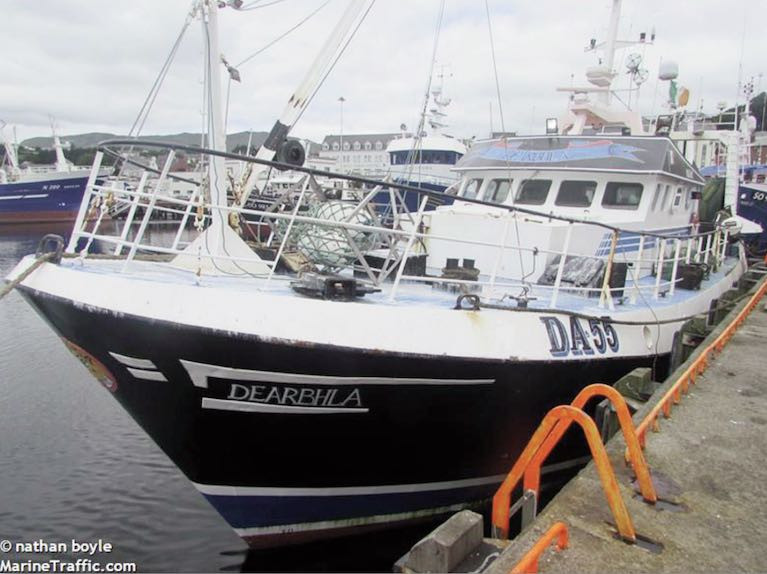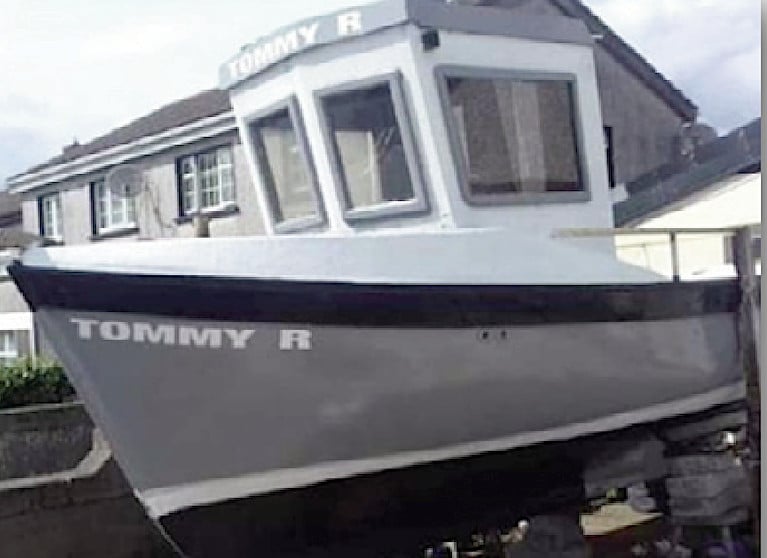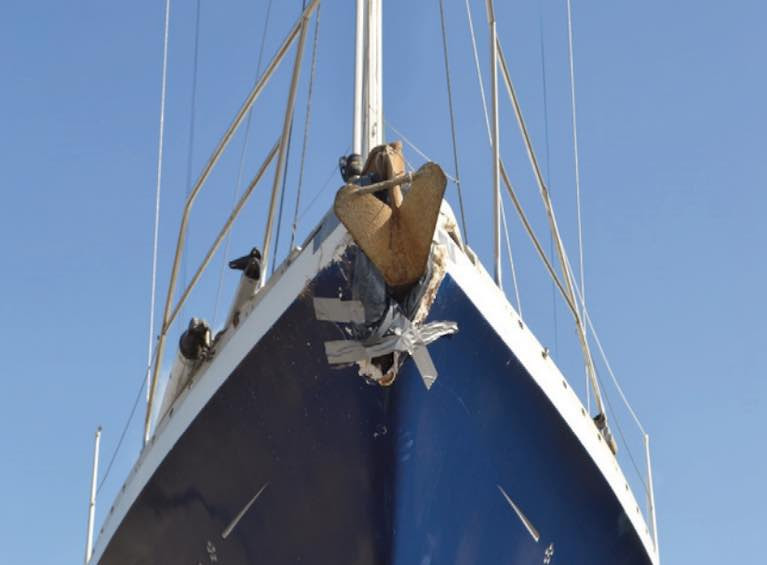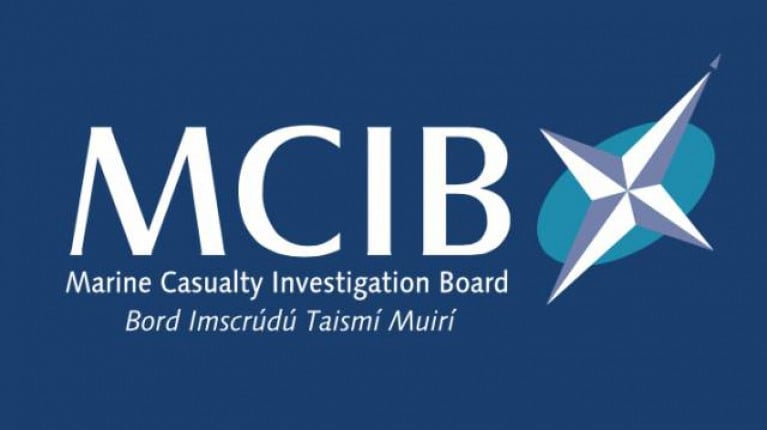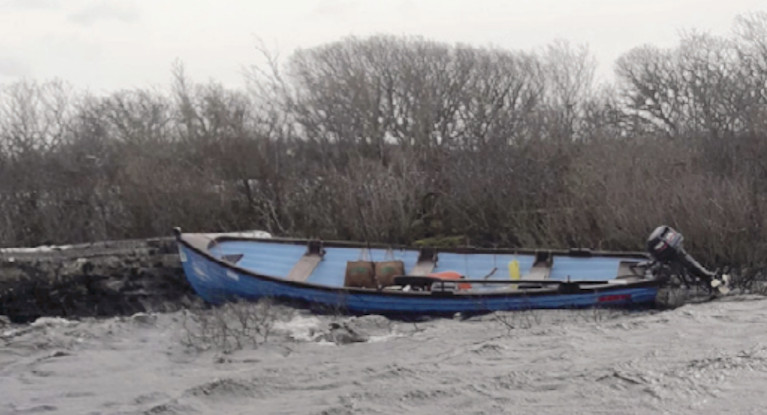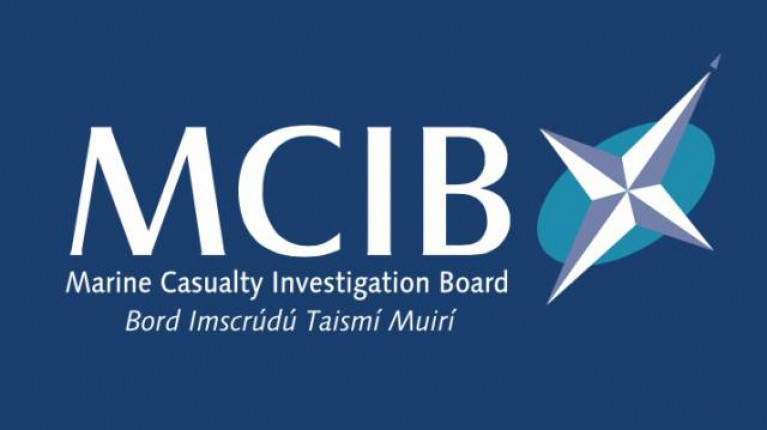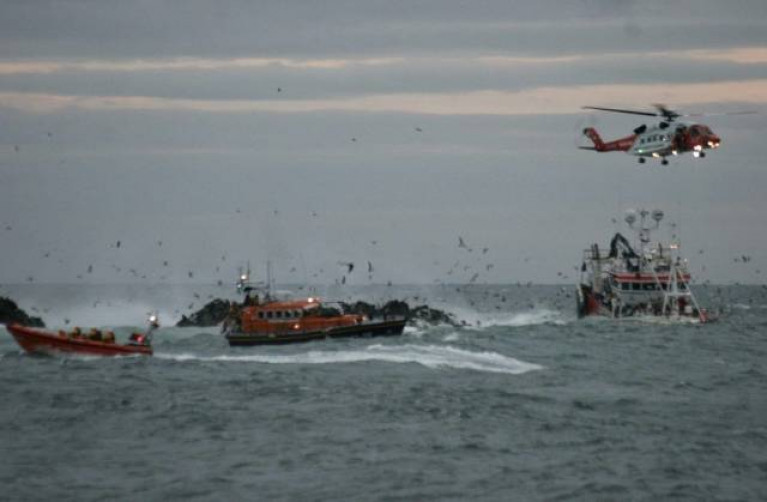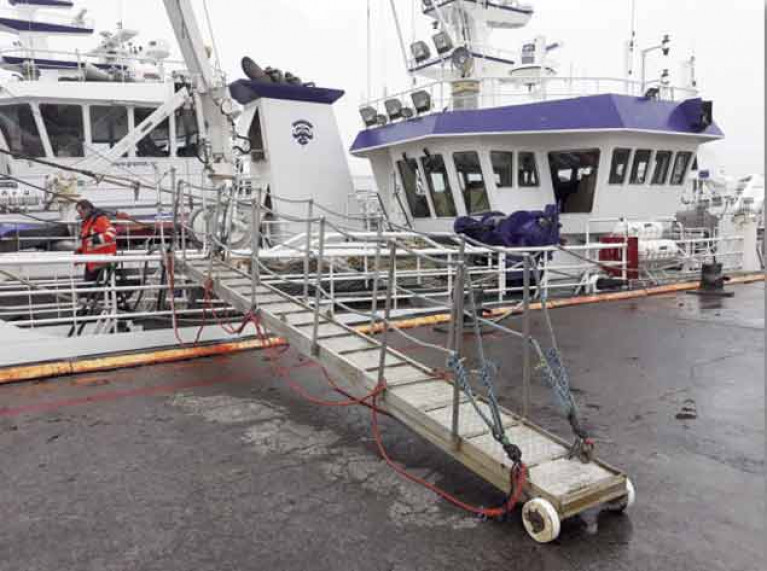Displaying items by tag: Marine Casualty Investigation Board
Donegal Skipper May Have Become Ill or Got Trapped Below in his Own Fishing Vessel, MCIB Report Says
A 75-year old skipper may have become ill or got trapped in his own fishing vessel when finishing a day’s work close to the Donegal coast, according to the Marine Casualty Investigation Board (MCIB).
The MCIB report into the death of the skipper of the 9.2 m Teelin-based vessel Mirror of Justice on August 26th, 2020, says it would appear that this happened when the skipper was either beneath the wheelhouse floor or in the forepeak compartment as he was “not visible to a helicopter winchman”.
The Sligo-based Rescue 118 helicopter, the RNLI Arranmore Lifeboat, the Killybegs Coast Guard Delta RIB and shore crew, the Garda Síochána and a number of local vessels had been involved in the search for the skipper after his vessel was spotted drifting close to rocks west of Teelin Bay, Co Donegal.
The skipper was described as being a “fit, competent and experienced fisher, with a sound understanding of the risks involved in all fishing operations and who would have implemented appropriate contingency actions in the event of a breakdown or a distress situation”.
Due to an Atlantic swell, the vessel broke up on the rocks on which it grounded. Shortly afterwards the casualty was found floating nearby wearing flotation type oilskins but no personal flotation device (PFD).
The vessel fished for squid using rod and reel, west of Teelin Harbour, and had departed Cladnageragh at approximately 09.30 am, with an expected return time of about 8.30 pm.
The skipper had left a note for his wife to say he was going to “Green nose”, a fishing area between Slieve League and Rathlin O’Beirne, marked as “Giants-rump” on the chart, approximately 3.5 nautical miles (NM) west and along the coast from Teelin Bay.
The operation involves the use of several rods and reels and special types of lures called squid jigs. Squid are caught in areas with stony sea beds and finding an area where squid are present is a matter of trial and error or by using local knowledge. Any catch was to be sold to market.
 The wreck of the FV Mirror of Justice Photo: MCIB
The wreck of the FV Mirror of Justice Photo: MCIB
Weather at the time was moderate occasionally fresh at first – Beaufort 4 or 5 (mean wind speed 15 – 20 knots) and occasional gusts up to 25 knots.
The winds gradually decreased during the period to light – Beaufort force 3 (mean wind speed 8 to 10 knots) by the end of the period. Wind direction was westerly and backed south-westerly later in the period.
At no time before or during the incident, were there any reports that the Skipper of the “FV Mirror of Justice” attempted to call for help either by VHF radio or by phone, which was found on his possession following recovery, the MCIB report says.
It also says he made no attempt to indicate distress with hand flares and there is also no evidence that he made any attempt to arrest the drift of the vessel by anchor or any other means.
The MCIB report recommends that the Irish Maritime Administration of the Department of Transport should intensify its efforts to promote maritime safety awareness.
It says this should be done “through a process of information and communication”, promoting “more effective communication between key stakeholders as detailed in the Maritime Safety Strategy”.
Minister for Transport Eamon Ryan says he plans a review of how marine accidents are investigated which should take “several months”.
Addressing an Oireachtas Transport and Networks Communications committee on Friday (Jan 29), Mr Ryan said that the the “fundamental review” would be conducted by an independent expert.
The review would examine “the structures in place for marine accident investigation”, how it is structured overseas and how “other modes” are treated in Ireland, he said.
“This is by no means a criticism of the Marine Casualty Investigation Board (MCIB) and its members past and present, its secretariat or its investigators and the valuable work they have undertaken,” Mr Ryan said
“However, circumstances have changed since the Policy Review Group’s 1998 report and the enactment of the 2000 Act and in light of the European Court of Justice judgment, I consider it to be an opportune time to have such a review,” he said.
“The review will look at how maritime accident investigation is structured overseas and also how other modes are treated in Ireland,” he said.
Last year, the European Court of Justice found that the MCIB was not independent, as its board included the Department of Transport secretary-general, or his or her deputy, and the Marine Survey Office (MSO) chief surveyor.
These two post holders resigned last year.
However, a report to the Oireachtas committee earlier this month by maritime lawyer Michael Kingston said the MCIB was “not fit for purpose”, stating it was under-resourced and had failed to conduct a number of investigations which it was statutorily obliged to.
At Friday’s committee hearing, Mr Ryan rejected a call by Mr Kingston for the immediate establishment of an independent investigation unit into marine accidents with adequate resources.
Mr Kingston, whose father Tim died in the Whiddy Island Betelgeuse explosion in 1979, pointed out a review had already taken place in 1998 with recommendations, and another review would only delay matters.
Mr Kingston said lessons needed to be learned from marine accidents, and this required a properly resourced investigation unit which might cost €350,000.
He said it would be a fraction of the cost of a €50 million annual search and rescue helicopter contract.
His call was supported by Fine Gael TD for Clare Joe Carey, Fianna Fáil senator Timmy Dooley and Green Party TD Steven Matthews who urged Ryan to take more immediate action than commissioning another review which might be “long-fingered”.
Mr Ryan said that he intended to proceed with amendments to the Merchant Shipping (Investigation of Marine Casualties) (Amendment) Bill 2020, which would involve reconstituting the MCIB board.
He said that the 1998 review was no longer sufficient, and further legislation could be introduced after a review took place.
Mr Ryan said the Merchant Shipping (Investigation of Marine Casualties) (Amendment) Bill 2020 should be” viewed as a transitional measure and not a permanent legislative framework for marine accident investigation in the State”.
“Further legislation may be required following completion of the review,” he said.
“Pending the outcome of the Review, it is imperative that the State continues to have a functioning marine investigation body in place,” he said.
Teamaker in Wheelhouse Could Have Averted Potentially Serious Grounding, Report Finds
A potentially serious incident involving a fishing vessel in Kerry’s Blasket Sound could have been avoided if there were adequate facilities in the wheelhouse to make hot drinks, a report has found.
Five crew onboard the 23m trawler Dearbhla had a narrow escape, when their vessel struck rocks off the north-west of Inis na Bró in the Blaskets on May 14th last.
The skipper was able to manoeuvre the vessel into deeper water, but it was found to have sustained substantial damage on its stern and under the bow when it was examined later in Bere Island Boatyard, Co Cork.
The Dearbhlá was on its way from Ros-a-Mhil, Co Galway to Howth, Co Dublin via the Kerry coast with a relief skipper when the incident occurred at about 4.10 am on May 14th.
The Marine Casualty Investigation Board (MCIB) report into the incident records that there was a moderate northerly breeze when the vessel left Ros-a-Mhíl on the evening of May 13th, decreasing to light winds with good visibility and slight sea state.
The vessel was northwest of Sybil Point at 3 am when the skipper called a crewmember, named “A” in the report, to take over the wheelhouse watch and instructed him to proceed through Blasket Sound.
The skipper had gone to his bunk when crew member “A” changed course and then went to the tea station in the crew mess to make a cup of tea
Before leaving the wheelhouse, he switched off the watchkeeper alarm, which is timed to give an audible sound every ten minutes to ensure the watchkeeper remains alert.
The crewman forgot to turn back on the watch alarm when he returned with his tea, and fell asleep shortly after. There was no one else on the bridge, and the bridge watch alarm was switched off also.
The vessel was on autopilot, and making a speed of 8.7 knots, but a course change was required before it reached the Blasket island of Inis na Bró.
When the fishing grounded on rocks on the northwest peninsula of Inis na Bró, the skipper was called immediately and the crew alerted
The report says the skipper manoeuvred the fishing vessel away from the rocks, and the crew investigated the damage – establishing that there was no water ingress, and no vibration felt from the propulsion system.
As the skipper didn’t think the vessel was in danger, the emergency services were not alerted, and he continued at reduced speed while a continuous assessment was made
After the skipper contacted the owner at 8 am, the vessel was re-routed to Berehaven for inspection and damage assessment at Bere Island Boatyard, arriving at 9am.
On May 15th, the vessel was inspected by a Marine Survey Office (MSO) surveyor, who detained it on the grounds of the damage to the bow and stem and expired certification.
The MCIB report says that “by falling asleep whilst on watch in the wheelhouse, the watchkeeper did not make the necessary course alteration to keep the vessel in safe and navigable waters”
It says the incident may have been averted if the required course change to navigate Blasket Sound safely was better supervised, and if there were adequate facilities in the wheelhouse to make beverages and allow watchkeepers to take light refreshments
It also says it may have been averted if the watchkeeper alarm panel keyed switch facility had been used as intended by its designer.
It says that “no evidence was provided demonstrating that the crew had received adequate training to reduce the risks of endangering the health and safety of the crew or preventing accidents”.
It recommends the Minister for Transport should remind owners and operators of fishing vessels of the need for training under the Merchant Shipping (Safety of Fishing Vessels) (15 – 24 metres) Regulations 2007, particularly relating to health and safety and accident prevention.
It also says the minister should remind owners and operators of the obligation to notify the MSO Chief Surveyor when a vessel has been involved in a marine casualty.
It recommends the minister issue a marine notice to remind vessel owners and operators to ensure “all navigation is planned in adequate detail, and that passage plans, with contingency plans where appropriate, are compiled and made known to the crew”.
These contingency plans and procedures should include provision for a grounding event or collision incident, it says.
Download the full report here.
Young West Cork Fisherman Who Died Last Year May Have "Fallen Overboard", MCIB Report States
An investigation into the death of the young west Cork fisherman Kodie Healy in Dunmanus Bay last year says he may have fallen overboard his boat.
The Marine Casualty Investigation Board (MCIB) report published today says Mr Healy had only bought the boat three to four weeks before the incident on October 9th, 2019.
The 23-year-old man was a trained and experienced commercial fisherman and was on a day off when he went fishing for mackerel and pollack in the 5.7-metre open deck GRP vessel Tommy R
He was not wearing a lifejacket or personal flotation device (PFD), and the report notes that he may not have known that there was a satellite personal locator beacon (PLB) onboard the vessel.
The hull was not found, but wreckage was picked up widely, and his body was located by divers north-west of Carbery island in a gulley or crevice in 11 metres of water on October 13th.
There had been an extensive search for Mr Healy, after he was reported overdue by his father, John Healy - from a well known west Cork fishing family - on the evening of October 9th last year.
An autopsy identified death by acute cardio-respiratory failure due to drowning.
The MCIB report concludes that “the most probable cause” of his death was that he fell overboard sometime after 1 pm when close to the northwest shore of Carbery Island.
“The ‘Tommy R’ steering would have been uncontrolled and the boat would have come into close proximity of the Carbery breaker or the seas northwest of Carbery island,” the report says.
The boat would then have been “overwhelmed, broken up and sunk by a breaking sea”.
Contributory factors identified by the MCIB include adverse weather, with a small craft warning and rough seas in Dunmanus Bay.; and the fact that Mr Healy was not wearing a PFD.
The report says he was fishing “on his own in very dangerous seas off Carbery breaker and Carbery island”, and the vessel was not suitable for those sea conditions on that day.
The qualified commercial fisherman who trained at the National Fisheries College, Castletownbere had left to fish in Dunmanus Bay at 8 am on that morning,
The Irish Coast Guard, RNLI, Naval Service, West Cork Underwater Search and Rescue dive team and Blackwater SAR Daunt and Cork Sub Aqua were among units involved in the extensive search.
Shortly before 10 pm that first night, boat wreckage was found at Drishane point on the Dunmanus peninsula.
The report says that the Tommy R was previously a fishing vessel named the FV Jamie Andrea, and was removed from the fishing vessel register by application in August 2017. As a recreational craft, it was exempt with compliance with the EU directive on fishing vessels of this size.
It says that “from the type and condition of the wreckage, it may be deduced that the boat’s sinking was rapid leaving little time for the casualty, if he was on board and not incapacitated, to send out a distress signal, call for help, grab a lifesaving device or prepare to abandon the boat”.
The report says Mr Healy used the boat for recreational fishing on several occasions prior to the incident.
The boat, built-in 1983, had declarations of compliance, with stability declared as satisfactory.
There was no record of a VHF licence, but the radio was reported to be working. However, there was no reported VHF communication from the vessel.
The report says Mr Healy intended to use a dive board method - a device with several fish lures attached which is trolled at the end of a line behind a boat moving slowly forward at around two to three knots.
In correspondence, Mr Healy’s father John included a number of omissions in the draft report.
Mr Healy said his son was a very experienced seaman, having fished from the age of seven and in waters from “Rockall to the English Channel” in later years.
“Personally, I believe that without more sightings of the boat on that day or, ideally, having the GPS tracker for that day, it is fair and reasonable to say at this time that only the sea holds the mystery of what happened,” Mr Healy wrote.
Airline Pilots on Yacht Which Collided with Tanker off Greystones
Two airline pilots on board a yacht which collided with a tanker off Greystones in the Irish Sea last year have disputed criticism of their experience in a report by the Marine Casualty Investigation Board (MCIB).
The MCIB inquiry into the collision between the 11.7m (38 ft) yacht Medi Mode and the 88m chemical tanker Varkan Ege on the night of August 23rd, 2019 highlights issues with some of the actions taken by both vessels.
The yacht was extensively damaged but was able to make its way to port, and there were no injuries and no pollution caused in the incident.
 Damage to hull, starboard side Photo: courtesy MCIB
Damage to hull, starboard side Photo: courtesy MCIB
However, the MCIB - which does not apportion blame or fault in its reports - calls on the Minister for Transport to alert recreational sailors and motorboat users to the need for “appropriate training” and compliance with international regulations on prevention of collisions at sea.
The event occurred in three miles east of Greystones at night, but with good visibility and good weather.
The Moody class yacht was en route to its home port of Howth, Co Dublin, and the chemical tanker registered in Turkey was on passage from Dublin to Falmouth, England.
 Tanker ‘Varkan Ege' Photo: courtesy MCIB
Tanker ‘Varkan Ege' Photo: courtesy MCIB
A “close quarters situation” and subsequent collision occurred at 02.22 hours.
The tanker stayed with the yacht to ensure it did not need assistance. It made its way to Greystones harbour.
The MCIB report says that the tanker reported seeing a red or port side light some 1.5 nautical miles away, and six minutes before the collision.
 A demonstration of the incident contained in the MCIB report
A demonstration of the incident contained in the MCIB report
It says the ship altered course to starboard four minutes before the collision. It also reduced speed and used “sound signal” to request the yacht to indicate its intentions.
The yacht had believed no risk of collision existed as the navigational warning lights on both vessels were “green to green” or starboard to starboard.
The yacht was unaware its own light was showing “red”, due to yawing of its mast from a following wind.
The yacht kept its course and speed in the belief that the tanker would pass clear on its starboard side, the report states.
While the report says the tanker “complied with efforts to avoid a collision when it became apparent that collision was possible”, it is critical of the fact that the tanker tried – unsuccessfully - to communicate via VHF radio with the sailing vessel when it was so close.
“This wasted valuable time when an immediate alteration of course to starboard may have been sufficient to avoid collision,” the report states.
It says that the two crew members of the yacht Medi Mode- who are not named in the report - had “many years’ experience of sailing” but they “had no formal marine navigation training”.
“They had no recognised course on the Collision Regulations (COLREGS),”the report says, noting “this was a contributory factor particularly in relation to International Regulations for Preventing Collisions at Sea 1972“.
In a response to the report, a representative of the yacht acknowledges that both crew did not have formal qualification in marine navigation.
It states that as “professionally qualified airline pilots of considerable experience, we are both well-grounded in the aviation COLREGS” or collision regulations”.
The letter says that these aviation collision regulations are “very similar to those pertaining to the marine, with an added third dimension”.
Under collision regulations, a power-driven vessel “shall keep out of the way of a sailing vessel”, but the report says that the yacht was not a sailing vessel in this situation as “both engine and sails were being used for propulsion”.
The report notes that the tanker claims it observed the yacht altering its course to port just before the collision, but the yacht says it kept its course. It says this cannot be determined definitively, as the yacht did not have the technology to record this.
However, the two vessels were on a collision course before it happened, the MCIB says, with the prow of the yacht striking the port bow of the tanker.
The report says the tanker’s speed was 7.5 knots and the yacht had a speed of 7.9 knots.
The report says that “both vessels should have observed each other and avoided a close-quarters situation developing”, where vessels are dangerously close.
It says the yacht should have seen the tanker’s lights at a range of six miles, and the tanker should have observed the yacht lights at a range of one mile.
It says the report by the master of the Varkan Ege tanker does not indicate there was a lookout on the bridge at the time of the collision but does state that the “lookout kept an eye of the sailing vessel”.
It also notes a “conflict” in the information provided by the master and the watchkeeper on the tanker.
It notes that neither vessel took compass bearings of each other to determine if there was a risk of collision.
The report says that “tiredness and fatigue cannot be completely ruled out as a contributing factor in the collision”.
The report recommends a marine notice highlighting the requirements in chapter two of the code of practise on the safe operation of recreational craft be issued by the Minister for Transport.
It says that “in particular, attention should be drawn to” the section on the need to undertake “appropriate” training in sailing and motorboat activities, and on compliance with the International Regulations for Preventing Collisions at Sea (1972).
Two Civil Servants Step Down from Marine Casualty Investigation Board
Two civil servants have stepped down from the Marine Casualty Investigation Board (MCIB), following a European Court of Justice ruling which found it lacked independence.
As The Sunday Times reports today, Ireland is not appealing the recent EU court judgment, according to the Department of Transport.
It is understood the Irish state is still liable for legal costs over its decision to challenge the European Commission’s issue with the board’s make-up.
The EU had taken issue with two of five board members being Ireland’s chief marine surveyor and the Department of Transport secretary-general’s nominee.
The EU said that the responsibilities and activities of both the transport department and Marine Survey Office (MSO) could conflict with the investigative task.
Confirming the resignations of both civil servants, the MCIB said it had been “advised that vacancies will be filled in accordance with standing Government policy after the introduction of legislation to give effect to the recent decision of the European Court of Justice”.
The Department of Transport said it has “sought legal advice on legislative and administrative options to address the court findings and the concerns of the EU Commission, and is currently examining same”.
The EU court judgment was published earlier this summer, two years after it initiated its case against Ireland over the MCIB’s lack of independence.
It found that Ireland was “not fulfilling its obligations under Article 8(1) of Directive 2009/18” governing the investigation of accidents in the maritime transport sector” .
In its defence, Ireland had argued that the MCIB reports are independent.
The MCIB is responsible under the Merchant Shipping Act and the Merchant Shipping Regulations for conducting investigations into marine casualties in Irish waters and Irish-registered vessels.
It is a non-prosecutorial body which does not enforce legislation, and its investigations do not apportion blame or fault, but recommendations have regularly been made to the Irish minister for transport.
However, almost 300 of its reports on commercial fishing and recreational casualties, and incidents involving ferries, ships and other vessels have been made public since its establishment 20 years ago.
Read The Sunday Times report here
PFD Not Worn by Angler who Drowned in Lough Mask - MCIB Report
An angler who drowned in Lough Mask in Co Mayo over a year ago was not wearing a lifejacket, the Marine Casualty Investigation Board (MCIB) has found.
A report by the MCIB published yesterday (Tues, September 1) has been unable to establish the cause of the incident in which a 78-year old experienced angler drowned in March 2019.
However, it says that the fact that the man’s boat was found in an upright position would suggest that he fell overboard and was unable to get back into the vessel.
The man, who lived locally near Lough Mask, left Cushlough slip near Ballinrobe at approximately 12.30 on March 8th, 2019.
Weather conditions deteriorated during the day from westerly force four to force six, with wind gusts of force seven.
The alarm was raised at 7.23 pm after the man failed to return at 6 pm and his mobile phone was off.
A local person travelled to his house to see if he had returned home and then contacted the gardai at Ballinrobe.
An air and coast search by the Irish Coast Guard Rescue 118 helicopter and Corrib Mask Search and Rescue found nothing, but the vessel was located the following day on the eastern shore of Lough Mask, about 1.5 nautical miles north of Cushlough slip.
The vessel was reported to be in “good order”, according to the MCIB report, with the outboard engine in the lifted position and the port side oar in the shipped position.
The report says the vessel’s starboard side oar was subsequently found in the water nearby, along with the angler’s cap.
A personal flotation device (PFD), fishing gear, supplies and rod were in the stowed position in the vessel.
 A PFD stowed in the forward part of the lake boat under the gunwale Photo: MCIB
A PFD stowed in the forward part of the lake boat under the gunwale Photo: MCIB
The search was hampered by prolonged bad weather periods. The man’s body was located on March 30th near where the vessel had been found. He was not wearing a PFD.
“The casualty was considered locally to be an experienced angler,” the report says, and “had been angling on Lough Mask for many years, and had entered numerous fishing competitions”.
However, it says that “even an experienced angler would have found the conditions challenging”.
An inquest on November 28th, 2019, recorded the cause of death as asphyxia due to drowning.
The MCIB report notes that Lough Mask has “no navigation marks to warn water users of danger”, and “with water levels at the time of the year when the incident occurred, awareness of hazards below the water would be all the more difficult”.
Water temperature at the time of the incident was 8°C, and the report notes that cold water shock is a factor in water temperatures below 15°C.
“This, combined with the casualty not wearing a PFD, would have considerably reduced his chances of survival”, it states.
The MCIB recommends that the Minister for Transport, Tourism and Sport issue a marine notice, reminding mariners of their obligations to comply with the “Code of Practice for the Safe Operation of Recreational Craft”.
It says special emphasis should be placed on the need to be aware of the current forecast for the area; the requirement to wear a PFD, and the need for a boarding ladder, or “other effective means of quickly re-boarding a vessel”.
It says “clubs should be requested to bring this notice to the attention of their members”.
Independence of Marine Casualty Investigation Board 'Not Guaranteed', European Court of Justice Rules
The European Court of Justice has ruled the State’s marine incident investigating body is not independent due to the presence of two civil servants on its board.
In a judgment issued late last week, the European Court of Justice (ECJ) said the Marine Casualty Investigation Board’s (MCIB) independence is “not guaranteed” and has awarded costs against Ireland.
Its ruling takes issue with the fact that the five-person MCIB board includes the Department of Transport secretary-general, or his or her deputy, and the Marine Survey Office (MSO) chief surveyor.
The ECJ ruling says that “in view of the functions performed simultaneously” by the two civil servants, Ireland is not fulfilling its obligations under Article 8(1) of Directive 2009/18” governing the investigation of accidents in the maritime transport sector” .
International maritime lawyer Michael Kingston has called for an “immediate public inquiry” into all investigations by the MCIB.
Mr Kingston, whose father Tim died in the Whiddy island Betelgeuse explosion 41 years ago, has already called for a “root and branch review” of the Department of Transport’s maritime safety directorate.
The Department of Climate Action, Communications and Transport said it is “examining the judgment in the case and is seeking legal advice to address the Court findings and the concerns of the EU Commission”.
The MCIB is responsible under the Merchant Shipping Act and the Merchant Shipping Regulations for conducting safety investigations and for drawing up reports and recommendations.
It is a non-prosecutorial body which does not enforce legislation, and its investigations do not apportion blame or fault.
However, its reports are made public, with recommendations to the Minister for Transport.
It has issued almost 300 reports since its establishment almost 20 years ago on commercial fishing and recreational casualties, and incidents involving ferries, merchant shipping and other vessels.
It published both an interim and final report into the death of Irish Coast Guard volunteer Caitriona Lucas off the Co Clare coast in September, 2016.
In taking the case against Ireland, the European Commission said the MCIB was not independent, on the basis that the responsibilities and activities of both the Department of Transport and the MSO could conflict with the investigative task.
The MSO holds administrative and enforcement functions in relation to ships and fishing vessels, related equipment, and the competence of mariners.
In its defence, Ireland argued that the MCIB reports are independent.
Ireland’s decision to defend the MCIB board’s composition had cost the taxpayer “substantial legal fees”, Mr Kingston said.
Mr Kingston says he has commissioned a formal report by Capt Neil Forde of Marine Hazard Ltd to carry out a review of the investigations, reports and recommendations of the MCIB.
Earlier this year, he made a submission to Garda headquarters seeking a Garda inquiry into the State's role in investigating marine accidents. He was accompanied by Independent TD Mattie McGrath and Anne Marie O’Brien, whose brother John O’Brien and his friend Patrick Esmonde drowned in 2010 off Helvick Head, Co Wexford.
Mr Kingston, who has worked as a consultant to the International Maritime Organisation, also claims that the State had been alerted to malfunctioning of emergency position indicating radio beacons (EPIRBs) before the deaths of Paul (49), Kenny (47) and Shane (44) Bolger from Passage East, Co Waterford in Tramore Bay in June 2013.
All three brothers had been wearing lifejackets when their punt capsized. Their emergency position indicating radio beacon (EPIRB) signals alerting rescue agencies to their location were not picked up.
The year after the incident, the manufacturer issued a product recall for EPIRBs manufactured between January 2005 and February 2008.
The Department of Transport subsequently confirmed that in 2010 it had contacted the manufacturer over false alerts and battery failures.
West Cork Vessel's Sinking in Co Down Identifies Need for Navigation Planning & Exercise Drills, Report States
The need for formal navigation planning has been highlighted in a Marine Casualty Investigation Board (MCIB) report on the sinking of a West Cork fishing vessel in Ardglass harbour, Co Down last year.
The report on the sinking of the FV Dillon Owen has also highlighted the need for emergency exercise drills to prepare for groundings and collisions.
The 23-metre pelagic vessel registered in Skibbereen, Co Cork, was entering Ardglass harbour to land herring and sprat and refuel in the early hours of October 23rd, 2019 when it lost power and drifted onto rocks at Phennick point.
As Afloat reported at the time, all five crew on board were uninjured and airlifted to safety, and there were unsuccessful attempts by RNLI lifeboats to tow the vessel off the rocks.
The vessel sank over the following days, and the wreck was recovered and sent for demolition. The MCIB report says there was no pollution of the environment.
The report says three distinct events occurred: the initial grounding; the loss of power; and finally the second grounding and sinking of the vessel.
It says the second grounding was caused by the failure of the crew to deploy the primary anchor as the prevailing wind sea direction drove the powerless vessel towards the north shoreline and Phennick Point.
It says the “depth of water here was shallow enough to drop an anchor in order to stop the vessel’s drift”.
“By first focusing on attempts to release the trawl doors the crew lost valuable time,”it notes.
The report cites the “Recommended Practice for Anchor and Mooring Equipment”, which states that “the use of otter boards/trawl doors should only be used if the vessel has lost its anchors”.
“The Dillon Owen had not lost its anchors, and timely release by the crew of the vessel’s primary anchor at this time would likely have averted the vessel’s second grounding at Phennick Point,” it says.
The report says the Minister for Transport, Tourism and Sport should issue a marine notice to remind vessel owners and operators to ensure all navigation is planned in adequate detail and with contingency plans, where appropriate.
It also calls on the minister to issue a marine notice “stating that fishing vessel owners and operators develop contingency plans and procedures and conduct emergency exercise drills to prepare for a grounding event or collision incident”.
It says that “where owners and operators of fishing vessels have an anchoring arrangement whereby chain cables are replaced by trawl warps”, crews should “ready anchors for deployment when entering or leaving port by connecting the trawl warp to the free end of the primary anchor chain”.
Two Separate Marine Investigations Warn of Risks of Boarding Fishing Vessels Under the Influence of Alcohol
The Minister for Transport has been urged to remind fishing crews of the dangers involved in boarding vessels under the influence of alcohol, following reports issued this week of two separate fatalities in ports.
The Marine Casualty Investigation Board (MCIB) found alcohol was a factor in the two unrelated incidents which occurred in Killybegs, Co Donegal in March 2019 and Rosslare, Co Wexford in May 2019.
In the Killybegs incident, a crewman from 50-metre Cork vessel MFV Menhaden died after he fell while crossing vessels in the port in the early hours of March 14th,2019.
Weather conditions were poor at the time with a lot of movement between vessels, the report says.
His vessel was in the Donegal port due to adverse weather and was one of three tied up alongside each other near the auction hall, including the Sligo-registered MFV Olgarry and Norwegian MFV Grip Transporter.
The report says there was a gangway rigged between the MFV Olgarry and the MV Grip Transporter, but there are no images on CCTV footage of this gangway being used by the casualty.
The alarm was raised after he was reported missing and a Killybegs Coast Guard team recovered his body on the shore on the east side of the harbour.
A post mortem report indicated death due to drowning at sea and the accompanying toxicology report indicated high levels of alcohol in the casualty’s system.
MFV Ellie Adhamh
In May 2019, a crewman onboard the 22-metre fishing vessel MFV Ellie Adhamh drowned after he fell between the deck and the quay wall in the early hours of the morning.
The vessel was in Rosslare Europort for a marine survey and had landed fish after its arrival on May 17th.
The MCIB says the toxicological analysis report from the post mortem confirms the casualty was under the influence of alcohol and “would have been a danger to himself and others in the port area at the time of the incident”.
“ As per the report on an incident at Killybegs on March 14th, 2019 this again highlights the dangers involved when attempting to board fishing vessels when under the influence of alcohol,” the MCIB says.
It recommends the Minister for Transport should issue a marine notice reminding fishing vessel crews of the dangers associated with boarding vessels under the influence of alcohol.
It also recommends that the minister issue a notice reminding fishing vessel owners and skippers of the duty of care to provide safe means of access to vessels while in harbour, and of the importance of wearing personal flotation devices while boarding or crossing vessels.
The MCIB also says that Rosslare Europort should “consider reviewing its operating procedures including bye-laws and security plans regarding fishing vessel operations in the port”.
“This should include movement of crewmembers within the port limits and ensuring the perimeter is secure at night and also a suitable location for the berthing of fishing vessels,” it says.




























